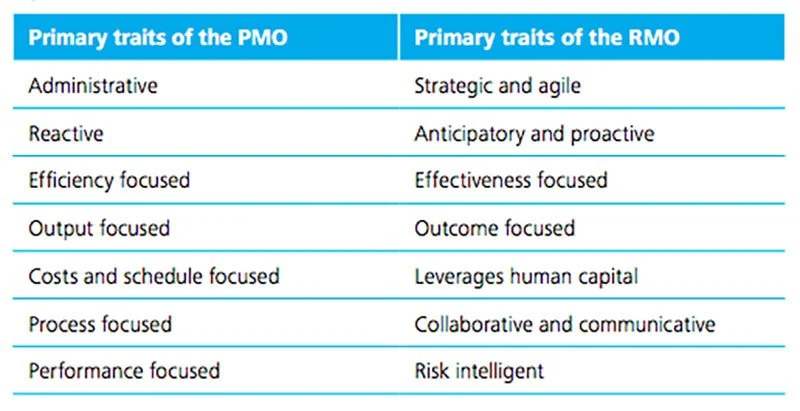Are We Grabbing the Results Management Office (RMO)?
About five years ago, I read a Deloitte Consulting paper on a concept that transforms the PMO (Project Management Office) into an RMO (Results Management Office). I posted a short blog asking if RMO is the new PMO. Today, I took a look to see how things are going.
The idea is simple. An RMO is like a PMO except it makes business value results as the top priority rather than the administration of schedules and budgets. In fact, PMO becomes a subset of the RMO. It doesn't go away. Changing into an RMO is a great idea. The reason is the same I made before when I asked if project managers are really admins. I claimed that project departments are not really driving results and business value, but rather are set up to administer portfolio schedules.
The following chart is the from the Deloitte article. I find this summarizes the differences mostly well.
However, I disagree with a couple traits. First of all, I find most PMOs are "task focused" rather than "process focused". Many claim their PMO is about driving good standards and processes, but when you look under the hood, they are mainly portfolio scheduling administrators. Secondly, let's say some good PMOs are indeed process focused. To say a PMO line item trait "process focused" whereas, that RMO trait is now "collaborative and communicative" doesn't make sense to me. You can't have one or the other as they are both needed. To be process focused, you need to be collaborative and visa versa. In fact, I see an RMO trait to be even more process focused in order to help drive the steps to define business value alignment, identify best execution paths (agile versus hybrid), and assess effectiveness. It's all process.
DID WE GRAP ONTO THE RMO CONCEPT?
Increased competitive landscape and business value expectations from upper management is driving some of the more progressive organizations to think more about results and business value. If you google with quotes "results management office" and set your search to show the last 12 months, you will indeed find quite a few job postings from RMO departments. If you change your search to the previous 12 months, you will see half as many postings. Although there may be other market factors explaining some of the differences, but the job growth declined some in the past year relative to the previous years. In any case, it's good to see it's increasing and not dying like a short-lived fad.
Although some are doing something about value creation, we still find resistance to change and continued project failure rates at 71%. What surprises me though, is that when I talked to PMO managers, most say end results win as a higher priority than being on time and on budget. If so, why are we seeing such a slow progress towards results oriented project management?
I suspect the main reason is because many of us are still trying to catch up with schedules and closing issues. What's funny though is that the RMO results approach will in fact help improve scheduling and budgeting by helping managers better manage their portfolios strategically, such as cutting down on lower business value work (i.e., not aligned with corporate strategy).
How to expand your PMO to an RMO
There may be a number of ways to do this, but here are some simple next steps to get your project and portfolio office started.
Start calling it an "RMO". This can be a psychological approach that will have power. A brand starts with imagination and painting a new picture.
Look at it as a phased approach. Remember that most of us are in putting-out-the-fire mode. We don't like disruption when we have a lot on the hot plate. Pick some initial targets, such as "starting with these key projects, we will require a slight change in their process that walks us through the steps of defining strategic business value alignment and how to execute to maintain that business value alignment." This of course assumes your projects are already following some sort of good process for execution.
Measure your end project results against end-client business value expectations. Go ahead and also measure against time and cost expectations, but extend this analysis to include business value end goal expectations.
After step three, even if your end-results value fail to meet expectations, don't worry right now. RMO is a new process and that new process is not guarantee immediate better results. But, rather it's saying that if you focus more on striving for better results, you WILL BE on a path for better results.
Keep improving your project processes with an RMO mindset.
Ok, that sounds easy and it is. However, if you want to get into the meat of it, read Deloitte's paper and information from other consultancies. Here's a paper from a PMI Conference presentation that goes into a lot of detail. However, keep in mind that when they say moving from process to results, it doesn't mean to move away from process, but rather extend the process to include results objectives, results planning, results execution, results assessment, and then back to improving the process from results lessons learned.
And to not leave out a short suggestion on tools, consider project management applications with a focus on process to help drive results-oriented execution.
Written by Paul Dandurand, PieMatrix Founder
Photo by: Alex Iby


